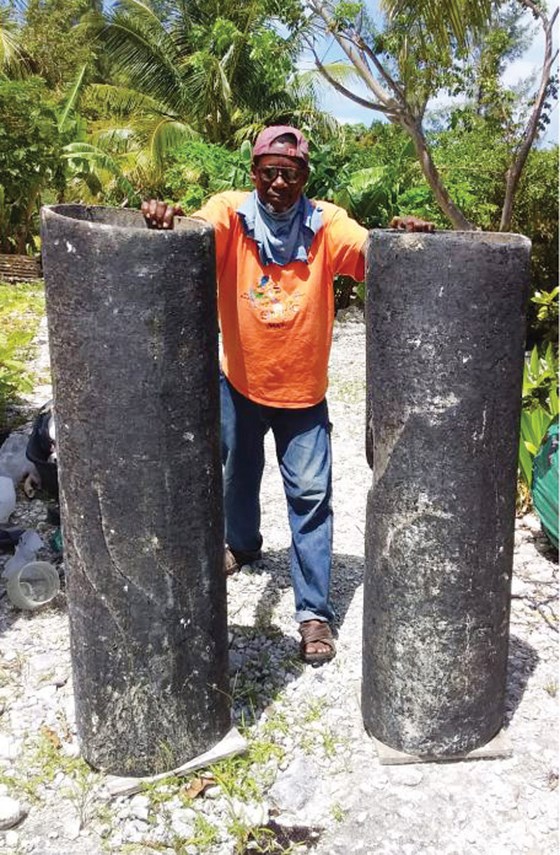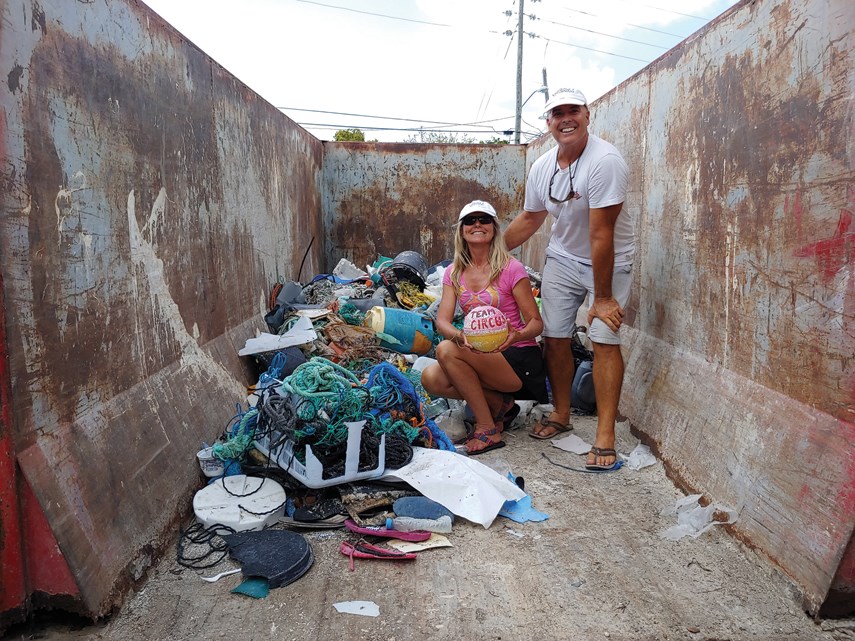We’re going to need a bigger dumpster.
That was how it looked a few hours before sunset in the Bahamas recently as a volunteer clambered atop an industrial-sized garbage bin and tried to stomp and squish 4,100 pounds of plastic.
The two-ton trash haul was the fruit of the first plastic fishing derby spearheaded by Lions Gate Hospital surgical assistant Angela Burns.
“Everybody was pretty exhausted,” she says. “We’d worked pretty hard in the sun but we were so happy.”
Burns, a Hillside Secondary grad with a lifelong love of sailing, says she’s been appalled by the spread of plastic befouling the most unlikely places.
“It seemed like no matter where we were, how remote, there was just plastic garbage on all these gorgeous beaches, even when there were no people,” she says, describing garbage floating at the uninhabited Chagos Archipelago.
Recently, Burns and partner Bill Atherholt hatched a plan to clean up some of the plastic waste by paying fishermen, boaters, tourists and anyone else willing to get their hands dirty to pick plastic from the water and beaches in the Bahamas for 25 cents a pound.
After raising $9,000 at a fundraiser earlier this year at The View on Lonsdale, Fishing for Plastic held their maiden voyage May 25.
Any “first-time trepidation” was quickly dispelled, according to Burns. As soon as teams signed up they were free to start scooping up bottles, crates, flip-flops and any other propylene refuse they could dig from the sand or sea.
One of the first teams were print shop employees who, just working a few hours each weekend as well as on derby day, scooped up about 1,200 pounds of plastic. Those efforts dispelled Burns’ first-time trepidation as well as the concern local Bahamians “weren’t as interested in this problem as other people who had moved there.”
The newly minted plastic fishermen – locals, visitors, sea cruisers and a team of 10 year olds – headed out in boats, pickup trucks, and walked the beach with reusable bags to do their part.
“It’s healthier to think of it as a world problem,” Burns says.
“People from the Bahamas would tell us: ‘You go out onto the Atlantic-facing beaches and you can see that cruise ships are throwing their garbage over.’”
Sitting in a coffee shop, Burns looks up from her smoothie and admits her skepticism.
“I really didn’t believe that that’s what was happening in this day and age,” she says.

But only a few days after the derby, news broke that Princes Cruises, a subsidiary of the Carnival Corporation, agreed to pay a $20 million penalty for environmental violations including dumping plastic overboard near the Bahamas.
When the derby ended, Burns told the volunteers the event was largely funded by the Vancouverites who donated to the cause.
“The Bahamians were really touched and moved by that,” she says.
It’s important to be humble, Burns says, gesturing to the plastic straw in her smoothie. (By the time she realized it was in there, it was too late, she explains.)
“I was proud of my big load of recycling but really, the problem is you don’t even know where it’s going.”
The mobility of plastic was also on display during the derby. Besides rewarding the heaviest catch, Burns also offered a prize for the weirdest item.
A headless Barbie doll that looked like it had been nibbled by sea creatures was the frontrunner until a fishermen came across a whisky bottle with an obituary, a passport photo, a joker playing card and a man’s ashes. The longtime traveller, David, had been put out to sea in the hope he’d wash up in Ireland.
“They miscalculated,” Burns laughs.
David is set to continue on his voyage, Burns promises. And likewise, Fishing for Plastic is set to carry on. The plan is to have an ongoing program paying fishermen 25 cents a pound for plastic.
“It’s pretty low-tech. There’s not a lot of expenses,” Burns says.
However, that may change as Burns and Atherholt explore ways to recycle the plastic rather than trucking it to a landfill.
“The most valuable thing right now is donation,” she says, explaining they’re trying to raise $50,000 to ensure the project is sustainable.
When the derby ended and the last bag had been slapped on the fish scale mounted over the dumpster, about 1,000 feet of beachfront were cleared. And while Burns knows more will wash ashore, there was a satisfaction in seeing a pristine beach.
“Being part of the solution really helped with offsetting the dismay,” she says. “There’s nothing worse than feeling like you can’t make a difference.”



